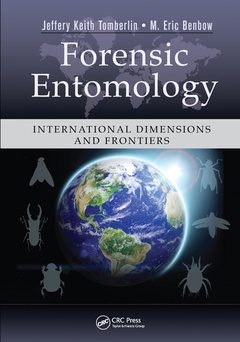Forensic Entomology International Dimensions and Frontiers Contemporary Topics in Entomology Series
Coordonnateurs : Tomberlin Jeffery Keith, Benbow M. Eric

The use of forensic entomology has become established as a global science. Recent efforts in the field bridge multiple disciplines including, but not limited to, microbiology, chemistry, genetics, and systematics as well as ecology and evolution. The first book of its kind, Forensic Entomology: International Dimensions and Frontiers provides an inclusive summary of worldwide research on this body of knowledge that integrates aspects of a wide range of scientific realms.
The book first reviews the history of forensic entomology, its accomplishments, and future challenges in nations around the world. It then provides perspectives of other scientific disciplines that are shaping the questions being addressed in the field. With an emphasis on medicolegal investigations, the book:
- Provides countrywide and regionally relevant syntheses on the current state and future of forensic entomology worldwide
- Presents insight from up-and-coming entomologists who offer new perspectives on the field while acknowledging their predecessors? contributions and foundational work
- Highlights both established and newly emerging areas of forensic entomology research that provide the foundation and future of this exciting discipline
- Discusses the success of forensic entomology and identifies key challenges to current work and practice
- Supplies an internationally cohesive perspective to emerging multidisciplinary dimensions and frontiers of forensic entomology
The book is designed to provide readers with a firm appreciation of the history of forensic entomology and the scientists who built its foundation in each of the countries presented. In doing so, it is destined to inspire new and exciting global collaboration among established researchers and newcomers to the field.
History, Accomplishments, and Challenges of Forensic Entomology in Australasia. Introduction to Australasian Chapters. China. Malaysia. Thailand. India. Australia and New Zealand. History, Accomplishments, and Challenges of Forensic Entomology in Europe. Introduction to European Chapters. Poland. United Kingdom. Belgium, the Netherlands, and Luxembourg. Sweden, Finland, Norway, and Denmark. France. Austria, Switzerland, and Germany. Italy. Spain. History, Accomplishments, and Challenges of Forensic Entomology in Africa. Africa. History, Accomplishments, and Challenges of Forensic Entomology in the Americas. South America. North America. Dimensions and Frontiers of Forensic Entomology. Experimental Design, Inferential Statistics, and Computer Modeling. Bayesian Statistics and Predictive Modeling. Forensic and Decomposition Microbiology. Methodologies in Forensic and Decomposition Microbiology. Applications of Soil Chemistry in Forensic Entomology. Molecular Biology in Forensic Entomology. Engineering and Forensic Entomology. Behavioral Ecology and Forensic Entomology. Community Ecology. Surface Hydrocarbons as min-PMI Indicators. Fit for Purpose? Standard Practices. International Collaborations and Training. Current Global Trends and Frontiers. Index.
Dr. Jeffery Keith Tomberlinis an associate professor and co-director of the Forensic & Investigative Sciences Program and principal investigator of the Forensic Laboratory for Investigative Entomological Sciences (FLIES) facility at Texas A&M University. Research in the FLIES facility examines species interactions on ephemeral resources such as vertebrate carrion, decomposing plant material, and animal wastes to better understand the mechanisms regulating arthropod behavior related to arrival, colonization, and succession patterns. His research is also focused on waste management in confined animal facilities and the production of alternate protein sources for use as livestock, poultry, and aquaculture feed.
Dr. M. Eric Benbowis an assistant professor in the Departments of Entomology and Osteopathic Medical Specialties at the Michigan State University. The research in his laboratory focuses on microbial–invertebrate community interactions in aquatic ecosystems, disease systems, and carrion ecology and evolution. All of these research foci use basic science to inform applications in forensics. He is regularly invited as a speaker at international and national academic meetings related to forensic entomology and has led workshops at the international level discussing experimental design, statistical analyses, and the importance of novel basic ecological concepts in advancing the field of forensic entomology.
Date de parution : 06-2020
17.8x25.4 cm
Date de parution : 03-2015
17.8x25.4 cm
Thèmes de Forensic Entomology :
Mots-clés :
Tetragonisca Angustula; Michigan State University; forensic entomology; Mortality Information System; medicololegal investigation; Federal Rural University; experimental design; Entomologia Forense; computer modeling; Lucilia Sericata; predictive modeling; Entomological Evidence; decomposition microbiology; Vertebrate Carrion; Bayesian statistics; Calliphora Vicina; inferential statistics; PMI Estimation; behavioral ecology; Hermetia Illucens; community ecology; Carrion Decomposition; Necrophagous Insects; DNA Barcoding; Insect Succession; Forensic Importance; Forensic Entomology Research; Empty Pupal Cases; COI; Forensic Entomology Laboratory; Chrysomya Megacephala; Carrion Beetles; Lucilia Cuprina; Cuticular Hydrocarbons; NRC Report



